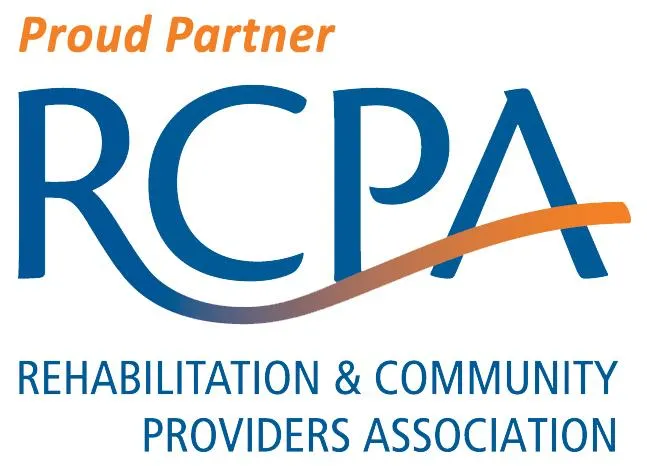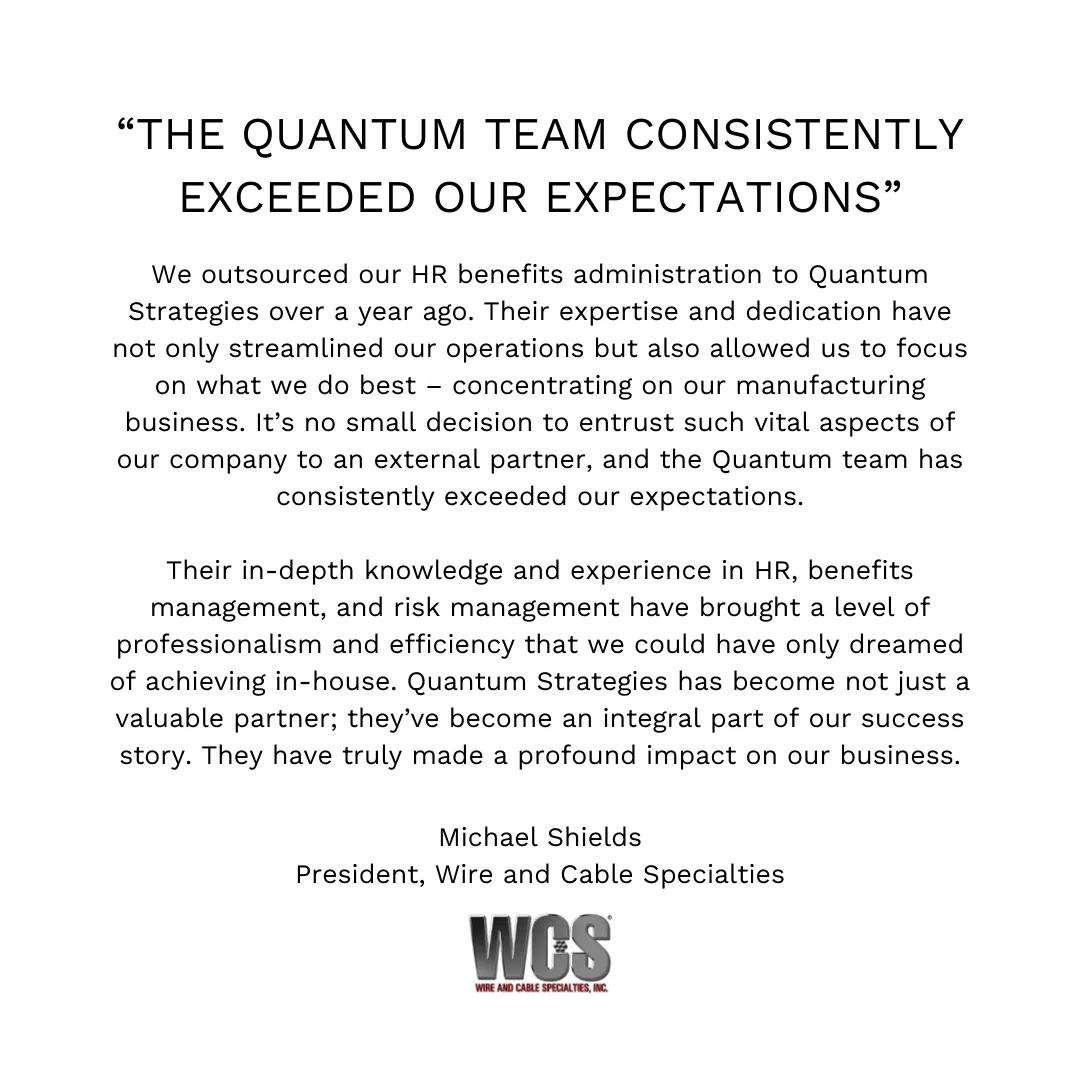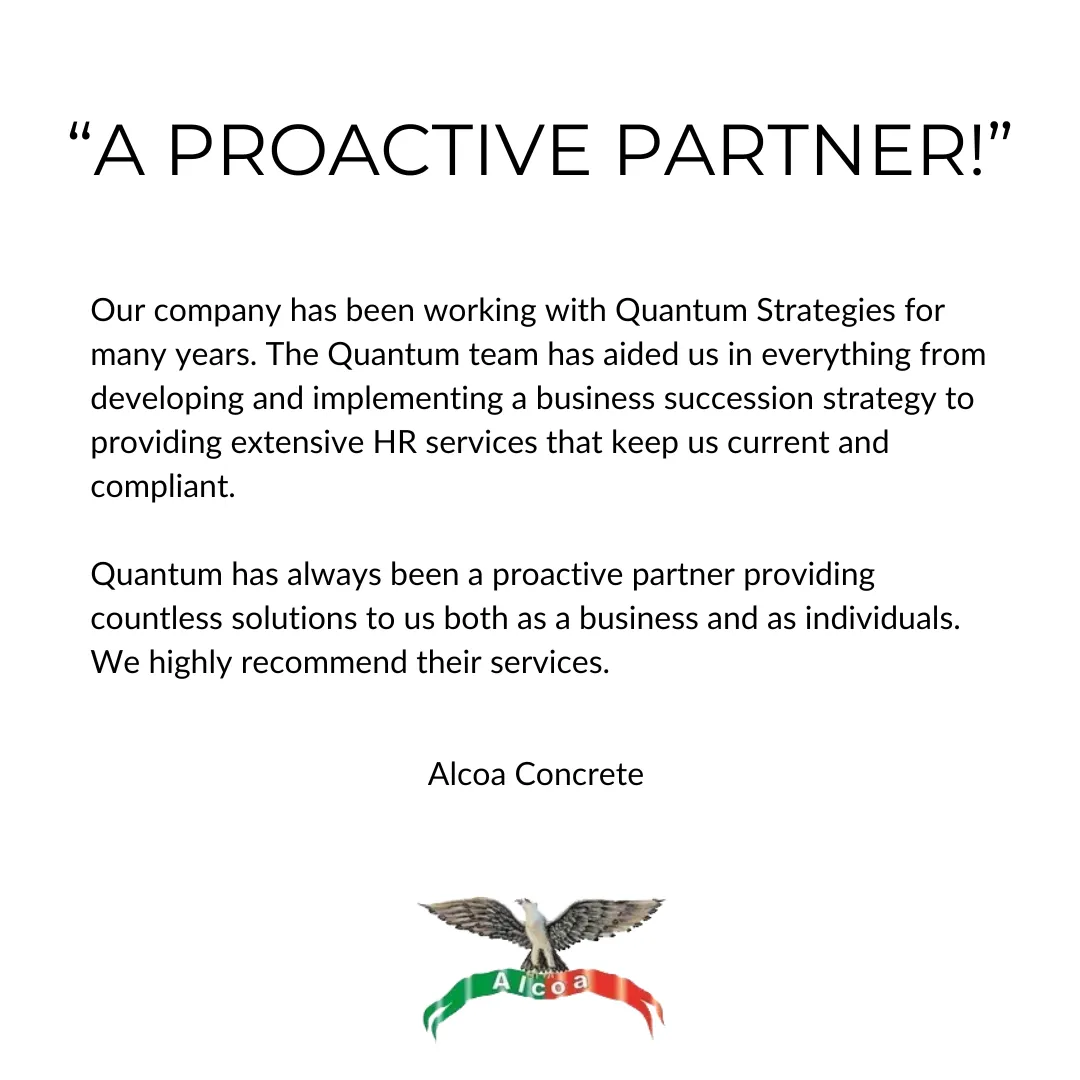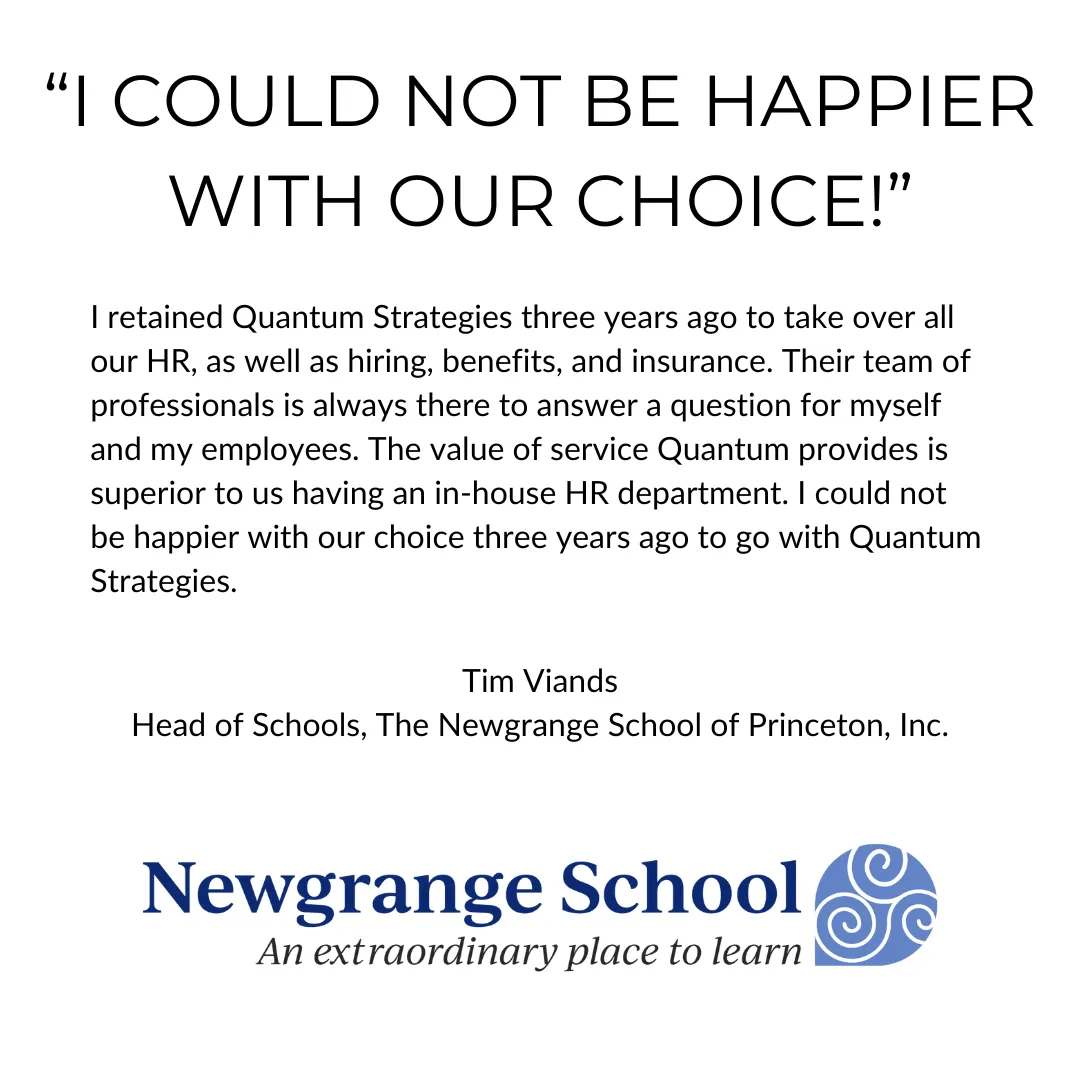Tailored HR Solutions as Unique as Your Business
Expert consulting and service to elevate your HR from a headache to a value driver.
Does Your HR Function Make the Grade?
Take our 5-minute quiz and evaluate the effectiveness of your HR function.

How We Help
We Focus on Your HR Needs,
So You Can Focus on Your Mission.
At Quantum Strategies, we understand that effective human resource management is the cornerstone of every successful business, regardless of size. Our mission is to provide tailored HR solutions that align perfectly with your unique business needs and growth stage.
Our Services
Navigating Change with Confidence: Quantum Expert HR Solutions
From Policy Assistance to Leadership Succession Planning, Quantum Strategies is Your Ultimate HR Resource to Solve Your Business Challenges.
HR Operational
Assessments
Unlock the full potential of your HR department. Our collaborative approach brings clarity and efficiency to your HR operations, providing a thorough analysis of your department's structure, costs, effectiveness, and needs.
Comprehensive Analysis: Detailed evaluation of your organization, workgroups, and individual roles for optimized efficiency.
Objective Insights: Receive a clear blueprint highlighting your HR department's strengths, weaknesses, and gaps.
Strategic Recommendations: Actionable plans focusing on technology utilization, communication enhancement, and leveraging department strengths.
HR Consulting and Managed Services
Tailored to align with your unique needs, our HR consulting and managed services enhance operational efficiency and effectiveness, allowing you to focus on your core mission while we optimize your HR investment.
Expert Supplemental Support: Strengthen your existing HR team with specialized expertise to navigate complex HR landscapes.
Personalized, Agile Solutions: Customized services for organizations with or without HR teams, adaptable to your specific requirements.
Goal-Oriented, Clear Communication: Delivering precise, actionable strategies that align with your organization’s goals and ensure successful execution.
Custom HRIS Design and Integration
Revolutionize your HR data management. Our team will evaluate your current human resources technology stack, offer recommendations, and then integrate your new and existing systems with our cutting-edge technology, ensuring seamless data flow and optimized operational efficiency.
Seamless Integration: Connect legacy systems with modern platforms for streamlined data management.
Tailored Design: Custom HRIS solutions uniquely crafted to meet your specific business needs.
Advanced Analytics: Leverage data-driven insights for strategic decision-making and operational excellence.
“Successfully steering through the specialized HR challenges within organizations of all kinds demands expert understanding, strategic planning, and precise implementation. With comprehensive knowledge of these challenges and the right solutions, your business can stay focused and successful in their vital missions.”
William J. Rizzo

Who we Are.
We Focus on Your HR Needs,
So You Can Focus on Your Mission.
At Quantum Strategies, we recognize that proficient management of human resources is fundamental to the success of any enterprise, irrespective of its scale. Our objective is to deliver customized human resource solutions that are in perfect harmony with your distinct business requirements and developmental phase.
Constant Improvement
Commitment to Customers
High Level Of Knowledge
Best Service You Can Get



Why Choose Us
A True Partner to Solve Your Most Complex HR Challenges.
Empowering HR Innovation and Compliance
Commitment to 100% Client Satisfaction
People-First Approach

Peace of Mind:
Handle ongoing compliance with ease

Employee Satisfaction:
Build a positive workplace with engaged employees

Strategic Confidence:
Drive strategy with advanced analytics

Leadership Development:
Equip your team with the tools to lead

2,245 +
Happy Clients

25 +
Years Of Experience

120 +
Professional Team
Testimonials
The Quantum Commitment - 100% CLIENT SATISFACTION!
At Quantum, we understand that your satisfaction matters most, and The Quantum Commitment is our way of putting that understanding into action. Experience the difference with a team that is dedicated to making your satisfaction the cornerstone of our service. Because when you choose Quantum, you choose excellence, reliability, and a commitment to exceeding your expectations every time.
Our Resources
Unveiling Proven Strategies and Insights.
Discover actionable tips, expert advice, and industry insights to fuel your journey towards success.

Fostering a Psychologically Safe Workspace
As we navigate the complexities of the post-pandemic world, the importance of mental health in the workplace has surged to unprecedented levels. According to research from the
American Psychological Association, 81% of employees are now actively seeking workplaces prioritizing mental well-being.
Key Challenges Faced by Human Resources in Nonprofit Organizations
The nonprofit sector brings its own set of specialized difficulties, especially in the area of human resources (HR). Although these difficulties may share some common ground with those in the for-profit industry, they possess unique characteristics that require special attention from nonprofit leaders.
FOUND THESE HELPFUL?
Explore Additional Articles and Resources In Our Blog

Effective Employee Management: Strategies That Work for Closely Held and Family-Owned Businesses
Why Employee Management is Crucial
Running a closely held and family-owned business presents unique challenges, and managing employees effectively is one of the most critical aspects. As a small business owner, you know that employee management goes beyond just assigning tasks; it's about fostering a productive work environment, encouraging growth, and ensuring that every team member is aligned with the company's goals. Successfully managing your employees is essential for maintaining motivation for existing and new employees, reducing turnover, increasing employee retention and employee relations, and driving long-term business success.
In this post, we'll dive into critical strategies that small business owners can use to manage human resources with their employees and company. We'll cover:
- Building a solid company culture
- Effective communication techniques
- The importance of continuous employee development
- Performance management practices
- The role of an HR software solution in small businesses
By the end of this article, you'll have practical insights to help you improve your employee management practices and create a more engaged and productive team through proper team building and an employee assistance program.

Building a Strong Company Culture
Creating a positive company culture is the cornerstone of effective employee management. For closely held and family-owned businesses, this means cultivating a work environment where employees feel valued, respected, and motivated. A strong company culture attracts and retains top talent, boosts morale, and encourages employees to go the extra mile for the business.
To build a strong company culture, start by clearly defining your core values and communicating them effectively to your team. These values should guide decision-making and behavior across the organization. Encourage open communication and collaboration among employees and regularly recognize and reward their contributions. Simple team-building activities can also strengthen relationships and create a sense of belonging.
Flexibility is another crucial element of a strong company culture. Small businesses can significantly benefit from offering various work arrangements, such as remote work options or flexible hours. This flexibility shows members of your team that employee benefits and their well-being are a top priority, which can lead to increased job satisfaction and loyalty. A flexible work environment can boost productivity by allowing employees to work when and where they're most comfortable.
Effective Communication Techniques
Effective communication is one of the most impactful workforce management tips that an HR department can implement. In closely held and family-owned businesses, where teams are often close-knit, transparent and open communication can make all the difference in ensuring everyone is aligned and working toward common goals.
Establish regular check-ins with your team through weekly meetings, one-on-ones, or team huddles. These sessions provide an opportunity to discuss progress, address challenges, and ensure alignment with business objectives. Creating an environment where employees feel comfortable voicing their ideas, concerns, and feedback is also essential.

Communication tools like Slack, Microsoft Teams, or Asana can enhance team collaboration, primarily if your team works remotely or across different locations. These platforms make sharing updates, assigning tasks, and tracking progress easier, keeping everyone informed and engaged.
In addition to these tools, consider setting up a system for anonymous feedback. Employees may hesitate to share their honest opinions in public, especially in a small business setting where relationships are close-knit. Giving the right people suitable options leads to a workplace of higher productivity and increased employee satisfaction. An anonymous feedback mechanism can provide valuable insights into areas where the business can improve and help address issues that might not be visible at first glance. This approach fosters transparency and continuous improvement culture, where employees feel their voices are heard without fear of retribution.
Continuous Employee Development
Investing in continuous employee benefits and development is a crucial strategy for effective employee management. This can be done while following all relevant labor laws, via human resources, and wellness programs, and by creating a highly productive workplace through a combination of the right people, albeit new hires or current team members alike. One such way you can do this would be by implementing a positive work environment through employee assistance programs and providing management tips and opportunities for career advancement and professional growth. For closely held and family-owned businesses, offering training and development opportunities enhances employee skills and shows your commitment to their growth, which can lead to higher retention rates.
Start by identifying the specific skills and knowledge essential for your business's success. Then, create a development plan for each employee that includes relevant training programs, workshops, or online courses. You can get ideas for this by looking through employee data and determining which skills are most pertinent to current and future business goals. Encouraging employees to pursue certifications or attend industry conferences can also contribute to their professional growth.
Beyond formal training, think about implementing mentorship programs within your organization. Pairing less experienced employees with seasoned mentors can provide valuable on-the-job learning and help build a robust support system within the team. Regularly reviewing and updating development plans ensures they align with the employee's goals and the company's evolving needs.
Creating a culture of learning is equally important. Encourage your employees to take ownership of their learning journey by providing access to various resources, like online courses, industry publications, and webinars. Setting up a company library or knowledge-sharing platform where employees can access materials can help them stay updated on industry trends and best practices. By fostering a continuous learning environment, you enable your employees to develop new skills and stay motivated, leading to more innovative contributions and a competitive edge for your business.

Performance Management Practices
Performance management is a critical component of effective human resource management. It involves setting clear expectations, providing ongoing feedback, and evaluating employee performance against established goals. You can simplify your performance management by aligning performance goals with overall business objectives using succession planning and payroll management. A well-structured performance management system can improve productivity and employee engagement for closely held and family-owned businesses. These and many other employee management software options can help small companies streamline processes, reduce administrative tasks, and create a more motivated and high-performing team. These management tips, such as choosing the right tools, allow one to focus more on growing your business while ensuring your employees are supported and engaged.
Begin by setting your employees' SMART (Specific, Measurable, Achievable, Relevant, Time-bound) goals. These goals should be aligned with your business objectives and provide a clear roadmap for what is expected from each team member. Regularly check progress, offer constructive feedback, and make any necessary adjustments to help employees stay on track.
Performance reviews are a vital part of this process. Regular reviews, whether quarterly or annually, allow you to assess individual performance, recognize achievements, and identify areas for improvement. It also provides a platform for employees to discuss their career aspirations and how they can contribute to the company's success.
Address issues promptly and constructively when dealing with underperforming employees. Offer support and resources to help them improve and set clear expectations for what needs to change. Handling performance issues with care and transparency can prevent small problems from escalating and help maintain a positive work environment.
Adding peer reviews into your performance management system can also provide a more comprehensive view of an employee's performance. Peer reviews allow colleagues to offer feedback on each other's work, highlighting strengths and identifying areas for growth from different perspectives. This 360-degree feedback approach can help employees understand how their peers perceive them and where they can improve, leading to more well-rounded development and a more vital team dynamic.

The Role of an HR Team and its Technology in Closely Held and Family-Owned Businesses
HR professionals have begun using technology, and it has become increasingly important for small businesses looking to streamline their employee management processes. A plethora of employee management software can be utilized to increase team communication, team building, and employee feedback; these can range from payroll systems, employee recognition platforms, employee wellness programs, payroll management, succession planning, performance management technology, and so much more. Access to the right tools can significantly enhance employee motivation, employee feedback, and overall efficiency and reduce administrative burdens.
One of the most valuable assets an HR department has is its tools for closely held and family-owned businesses, such as an all-in-one HR management system (HRMS). These platforms typically include features like employee record keeping, payroll processing, benefits administration, filing for medical leave, time tracking, and more. By automating these tasks, you can free up time to focus on more strategic aspects of workforce management, such as talent development and engagement initiatives.
Performance management software is an employee management system that can also help you track employee progress, set goals, and conduct performance reviews more effectively. These tools often include analytics features that provide:
Insights into employee performance trends.
Enabling you to make data-driven decisions about promotions.
Training needs.
Other HR functions and initiatives.
Investing in HR processes and technology doesn't have to break the bank. Many affordable solutions are designed specifically for small businesses. The key is choosing a system that meets your needs and can scale with your business as it grows.
Moreover, consider adopting employee self-service portals within your HR technology stack and processes. These portals allow employees to manage their personal information, access pay stubs, request time off, and even enroll in benefits independently. Empowering employees with these self-service tools reduces the administrative workload on your HR team. It gives employees more control over work-related matters, increasing satisfaction and efficiency.

Final Thoughts
Effective employee management is vital for any business's employee relations within closely held and family-owned businesses. By building a solid company culture, implementing effective communication techniques, investing in continuous employee productivity and development, and utilizing HR strategy and technology, you can create a work environment where employees thrive and contribute to the long-term success of your business.
Remember, employee management is an ongoing process that requires regular attention and adaptation. While using an employee management system is not 100% necessary, it is a valuable tool that can significantly simplify the process, making it easier to stay organized, track progress, and ensure your team is consistently aligned with your business goals. As your business grows, your strategies for managing your team should evolve, too. By staying proactive and focusing on the well-being and development of your employees, you can build a loyal, motivated, and high-performing workforce that drives your small business forward.
If you need help optimizing your employee management strategies, Quantum Strategies can help. Book your free consultation here today!
Connect
Keep Up with Our Latest News and Insights
Subscribe to Quantum Strategies' latest updates and insights.
Office: Philadelphia, PA | Glen Mills, PA | Washington, DC
Call 610.624.1770
Email: info@QS2500.com
Site: www.QS2500.com






